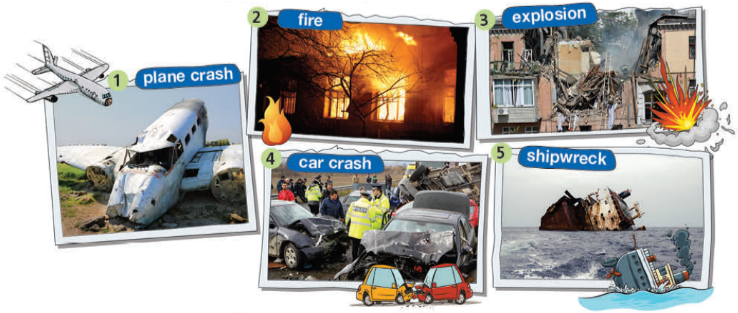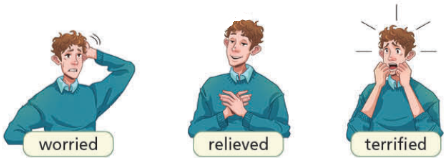Tiếng Anh 8 Unit 2 2c. Vocabulary1. Listen and repeat. 2 a) Listen and repeat. b) Choose the correct options. 3. Listen to an interview about a plane crash and complete the gaps (1-4). 4. Imagine you experienced the plane crash in Exercise 3. Tell your partner what happened and how you felt. Quảng cáo
Lựa chọn câu để xem lời giải nhanh hơn
Bài 1 Accidents (Tai nạn) 1. Listen and repeat. (Lắng nghe và lặp lại.)
Phương pháp giải: plane crash: tai nạn máy bay fire: hỏa hoạn explosion: vụ nổ car crash: tai nạn ô tô shipwreck: chìm tàu Bài 2 a Feelings (Cảm giác) 2a) Listen and repeat. (Lắng nghe và lặp lại.)
worried: lo lắng relieved: nhẹ nhõm terrified: kinh hoàng Bài 2 b b) Choose the correct options. (Chọn các phương án đúng.) 1. Everyone was terrified/relieved after the firefighters put out the fire. 2. Were you relieved/worried when you saw the car crash? 3. John felt terrified/relieved when he heard the explosion. 4. Katie was worried/relieved about getting in a plane crash when she flew the first time. 5. I felt worried/relieved after the shipwreck because no one was injured. Phương pháp giải: worried: lo lắng relieved: nhẹ nhõm terrified: kinh hoàng Lời giải chi tiết:
1. Everyone was relieved after the firefighters put out the fire. (Mọi người thở phào nhẹ nhõm sau khi lực lượng cứu hỏa dập tắt đám cháy.) 2. Were you worried when you saw the car crash? (Bạn có lo lắng khi nhìn thấy vụ tai nạn ô tô không?) 3. John felt terrified when he heard the explosion. (John cảm thấy vô cùng sợ hãi khi nghe thấy tiếng nổ.) 4. Katie was worried about getting in a plane crash when she flew the first time. (Katie đã lo lắng về việc bị tai nạn máy bay khi cô ấy bay lần đầu tiên.) 5. I felt relieved after the shipwreck because no one was injured. (Tôi cảm thấy nhẹ nhõm sau vụ đắm tàu vì không có ai bị thương.) Bài 3 Listening 3. Listen to an interview about a plane crash and complete the gaps (1-4). (Nghe đoạn phỏng vấn về một vụ tai nạn máy bay và điền vào chỗ trống (1-4).) 1. Larry heard a loud when he was sitting in his seat. 2 Something was with the plane. 3. The pilot landed the plane on the . 4. Larry felt because everyone was safe. Phương pháp giải: Bài nghe: Woman: Welcome Larry, can you tell us what happened to you? Larry: Yes, I was sitting in my seat on the plane when I heard a loud noise. Woman: Was it an explosion? Larry: No, but something was wrong with the plane. The pilot told us we were going to land on a river. Woman: What happened next? Larry: I'm not sure. It all happened so fast. Soon we were landing on the river. Woman: Did the plane go under the water? Larry: No, the river wasn't very deep. Everyone got off the plane safely. Woman: How did you feel about the crash? Larry: I was terrified when it was happening, but later I was relieved because everyone was safe. Woman: Thank you for telling us your story. Next up. Tạm dịch: Người phụ nữ: Chào mừng Larry, bạn có thể cho chúng tôi biết chuyện gì đã xảy ra với bạn không? Larry: Vâng, tôi đang ngồi trên ghế của mình trên máy bay thì nghe thấy một tiếng động lớn. Người phụ nữ: Đó có phải là một vụ nổ? Larry: Không, nhưng có gì đó không ổn với máy bay. Phi công nói với chúng tôi rằng chúng tôi sẽ hạ cánh trên một con sông. Người phụ nữ: Chuyện gì đã xảy ra tiếp theo? Larry: Tôi không chắc. Mọi chuyện xảy ra quá nhanh. Chẳng mấy chốc chúng tôi đã hạ cánh trên sông. Người phụ nữ: Máy bay bay có bị chìm dưới nước không? Larry: Không, dòng sông không sâu lắm. Mọi người đã xuống máy bay an toàn. Người phụ nữ: Bạn cảm thấy thế nào về vụ tai nạn? Larry: Tôi đã rất sợ hãi khi nó xảy ra, nhưng sau đó tôi cảm thấy nhẹ nhõm vì mọi người đều an toàn. Người phụ nữ: Cảm ơn bạn đã kể cho chúng tôi câu chuyện của bạn. Tiếp theo. Lời giải chi tiết:
1. noise (n): tiếng ồn Larry heard a loud noise when he was sitting in his seat. (Larry nghe thấy một tiếng động lớn khi anh ấy đang ngồi ở chỗ của mình.) Thông tin: Yes, I was sitting in my seat on the plane when I heard a loud noise. 2. wrong (adj): sai/ có vấn đề Something was wrong with the plane. (Có gì đó không ổn với máy bay.) Thông tin: No, but something was wrong with the plane. 3. river (n): dòng sông The pilot landed the plane on the river. (Phi công hạ cánh máy bay trên sông.) Thông tin: the pilot told us we were going to land on a river. 4. relieved (adj): nhẹ nhõm Larry felt relieved because everyone was safe. (Larry cảm thấy nhẹ nhõm vì mọi người đều an toàn.) Thông tin: I was terrified when it was happening, but later I was relieved because everyone was safe. Pronunciation 4. Imagine you experienced the plane crash in Exercise 3. Tell your partner what happened and how you felt. (Hãy tưởng tượng em đã trải qua vụ tai nạn máy bay như trong Bài tập 3. Hãy kể cho bạn cặp của em chuyện gì đã xảy ra và em cảm thấy thế nào.) Lời giải chi tiết: A: I heard that you were in a plane crash last week. Can you tell me what happened to you? (Tớ nghe nói cậu đã gặp tai nạn máy bay vào tuần trước. Cậu có thể cho tớ biết những gì đã xảy ra với cậu không?) B: Yes, I was sitting in my seat on the plane when I heard a loud noise. (Được thôi, lúc đó tớ đang ngồi trên ghế của mình trên máy bay thì nghe thấy một tiếng động lớn.) A: Was it an explosion? (Đó có phải là một vụ nổ à?) B: No, but something was wrong with the plane. The pilot told us we were going to land on the sea. (Không, nhưng có gì đó không ổn với máy bay. Người phi công nói với chúng tớ rằng chúng tớ sẽ hạ cánh trên biển.) A: What happened next? (Điều gì đã xảy ra tiếp theo?) B: I'm not sure. It all happened so fast. Soon we were landing on the sea. (Tớ không chắc. Mọi chuyện xảy ra quá nhanh. Chẳng mấy chốc chúng tớ đã hạ cánh trên biển.) A: Did the plane go under the water? (Máy bay có chìm xuống nước không?) B: Yes, but soon it floated. Everyone got off the plane safely. (Có, nhưng rất nhanh nó đã nổi lên. Mọi người đã xuống máy bay an toàn.) A: How did you feel about the crash? (Cậu cảm thấy thế nào về vụ tai nạn?) B: I was terrified when it was happening, but later I was relieved because everyone was safe. (Tớ đã rất sợ hãi khi nó xảy ra, nhưng sau đó tớ cảm thấy nhẹ nhõm vì mọi người đều an toàn.)
|






















Danh sách bình luận